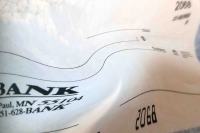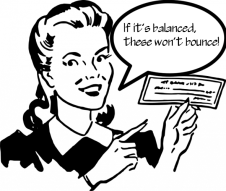Rubber Checks
I got a call today for the first time in years by someone who got a bad check as payment for services rendered. I remembered at some point in time there was a Minnesota Statute on point and I seemed to recall it had some significant penalties. Significant as in the penalty doubled the amount of the check.
The Statute
I took a look through the books and found the statute and it looked right on at first blush. It is Minnesota Statute, Section 604.113 and it goes like this:
Whoever issues any check that is dishonored is liable for the following penalties:
A service charge, not to exceed $30 . . . if notice of the service charge was conspicuously displayed on the premises when the check was issued . . .
If the amount of the dishonored check is not paid within 30 days after the payee or holder has mailed notice of dishonor . . . and a description of the penalties contained in this subdivision, whoever issued the dishonored check is liable to the payee or holder of the check for. . .the amount of the check, the service charge . . . plus a civil penalty of up to $100 or the value of the check, whichever is greater.
In determining the amount of the penalty, the court shall consider the amount of the check and the reason for nonpayment.
Minn.Stat. § 604.113.
A Couple Problems
#1: Inability to Explicitly State a Bounced Check Service Charge
Well, I had a few problems here. The first is rather obvious: Unless you are a retail store, odds are you do not have a sign prominently exhibited stating a service charge of $30.00 will be charged on all bounced checks. My caller was not a retail store and instead provides services at someone else’s place of business. So one down.
#2: The $100 Penalty
So you read along deeper into the statue and you see the $100 penalty.
Well, that’s mighty nice of our legislators to toss us that bone but, well, it’s just nice, I guess. That’s it.
 A hundred bucks is not that big of an incentive if the rubber check that bounced is for a couple/few thousand dollars or more.
A hundred bucks is not that big of an incentive if the rubber check that bounced is for a couple/few thousand dollars or more.
As you read on you come across the “or the value of the check, whichever is greater” part and you say:
Oh you brilliant elected officials! You based it on the amount of the check! It could not make more sense or been done in a better way. That has some teeth!
As usual, nothing is a good as it looks at first and you have to read the next sentence. With a casual read, it seems like it’s all good: It has the word Penalty and the word Court and the word Must. Nothing wrong here. But that is exactly what is wrong.
#3: No Default Judgement With Penalties
It is highly likely the Court will save the harshest penalty for the most egregious situations. It is doubtful the Court will throw the book at a check writer who bounced a single check for less than a couple hundred dollars. This only makes sense since the statute says the court has to consider the amount and reason for the rubber check.
And by saying the Court has to consider these factors, you cannot get a default judgment with the penalties added on (no one there to say why). See also Metro Gold, Inc. v. Coin, 757 N.W.2d 924, 928 (Minn. Ct. App. 2008)(due to the doctrine of impossibility, a comatose man not liable for penalties since he could not make the check good within the 30-day window allowed).
Attorney’s Fees to Save the Day? 
Attorney’s fees are available if all bad checks together are over $1,250. However, the amount of those fees is also discretionary with the Court and it just doesn’t make a whole lot of sense to impose a lot in attorney’s fees on a person whose bank account couldn’t fund the initial purchase as it is. So there’s that . . .
It’s a Crime to Bounce
There are criminal penalties for issuing worthless checks too: It is a misdemeanor if the check is under $250; A gross misdemeanor if the check is over $250 but less than $500; A felony if the check is over $500 (or if all bad checks written in a six month period added together are more than $500). Minn. Stat. § 609.535.
Fun, Fun, Fun with the FDCPA
Finally, if you are a debt collector, be wary of using this statute at all. A violation of the FDCPA can subject the debt collector to liability for actual damages, a $1,000.00 statutory penalty and an award of the debtor’s attorney’s fees (attorney’s fees are mandatory and have been 6 and even 10 times the amount recovered for the plaintiff). Phenow v. Johnson, Rodenberg & Lauinger, PLLP, 766 F. Supp. 2d 955, 959 (D. Minn. 2011).
There are cases with claims under the Fair Debt Collection Practices Act (FDCPA) where the Court found the FDCPA was violated by a collector for overstating the effect and amount of Minn. Stat. § 604.113 by saying the penalties “would be” imposed or that the debtor “was liable” for the penalties. Picht v. John R. Hawks, Ltd., 236 F.3d 446 (8th Cir. 2001)  .
.
Because the amounts are not fixed and the amount can only be finally determined by a Court, collection letters that state the penalties “will” or “shall” be imposed have been found to be volitional under the FDCPA §1692f(1)(prohibiting the attempt to collect any sum not specifically authorized by contract or law and strictly applied using the “unsophisticated consumer” as the baseline for determining violations). See Duffy v. Landberg, 215 F.3d 871, 875 (8th Cir. 2000)(debt collector stating interest that was inflated by $0.65-yes 65 cents-found to have violated FDCPA).
Carefully Closing
Minnesota’s worthless check statute: It’s not totally toothless–it can bite you back.

